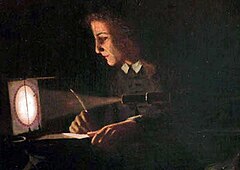Jeremiah Horrocks | |
|---|---|
 Romanticised Victorian painting of Horrocks making the first observation of the transit of Venus in 1639. No contemporary portraits of Horrocks survive.[1] | |
| Born | 1618 |
| Died | 3 January 1641 (aged 22) Toxteth Park, Liverpool, Lancashire, England |
| Alma mater | University of Cambridge |
| Known for | Transit of Venus Tides Elliptical orbit Lunar orbit |
| Scientific career | |
| Fields | Astronomy Mathematics Mechanics |
Jeremiah Horrocks (1618 – 3 January 1641), sometimes given as Jeremiah Horrox (the Latinised version that he used on the Emmanuel College register and in his Latin manuscripts),[2] was an English astronomer.[3] He was the first person to demonstrate that the Moon moved around the Earth in an elliptical orbit; and he was the only person to predict the transit of Venus of 1639, an event which he and his friend William Crabtree were the only two people to observe and record. Most remarkably, Horrocks correctly asserted that Jupiter was accelerating in its orbit while Saturn was slowing and interpreted this as due to mutual gravitational interaction, thereby demonstrating that gravity's actions were not limited to the Earth, Sun, and Moon.[4]
His early death and the chaos of the English Civil War nearly caused the loss to science of his treatise on the transit, Venus in sole visa; but for this and his other work he is acknowledged as one of the founding fathers of British astronomy.
- ^ Applebaum, Wilbur (2004). "Horrocks [Horrox], Jeremiah (1618–1641), astronomer". Oxford Dictionary of National Biography (online ed.). Oxford University Press. doi:10.1093/ref:odnb/13806. (Subscription or UK public library membership required.)
- ^ Marston, Paul (2007). "History of Jeremiah Horrocks". Archived from the original on 15 January 2008. Retrieved 8 December 2007. – See footnote 1
- ^ Clerke 1891
- ^ Hecht, E. (2021). "The True Story of Newtonian Gravity". American Journal of Physics. 89 (7): 683–692. Bibcode:2021AmJPh..89..683H. doi:10.1119/10.0003535. S2CID 237859936.